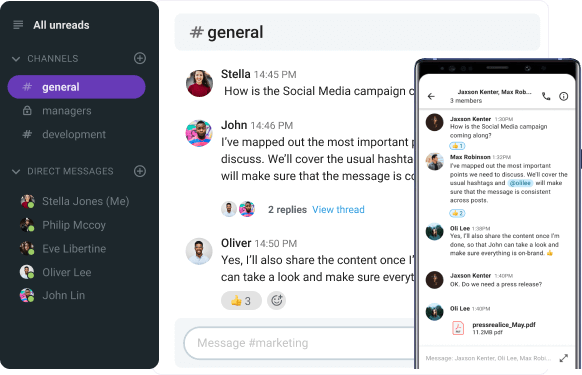In a corporate environment, it can be all too easy to start thinking about our coworkers, higher-ups, and even clients as cogs in a machine, rather than real people.
However, learning that someone you work with is ill or injured has a way of dispelling those thoughts.
In such cases, you may wonder whether you should send the affected person a “get well soon” message — or whether doing so could somehow be inappropriate.
Well, there are some situations when your “get well soon” messages may be poorly received.
But, before we discuss those special circumstances, let’s talk about why you should wish the people you work with a speedy recovery when the opportunity presents itself.
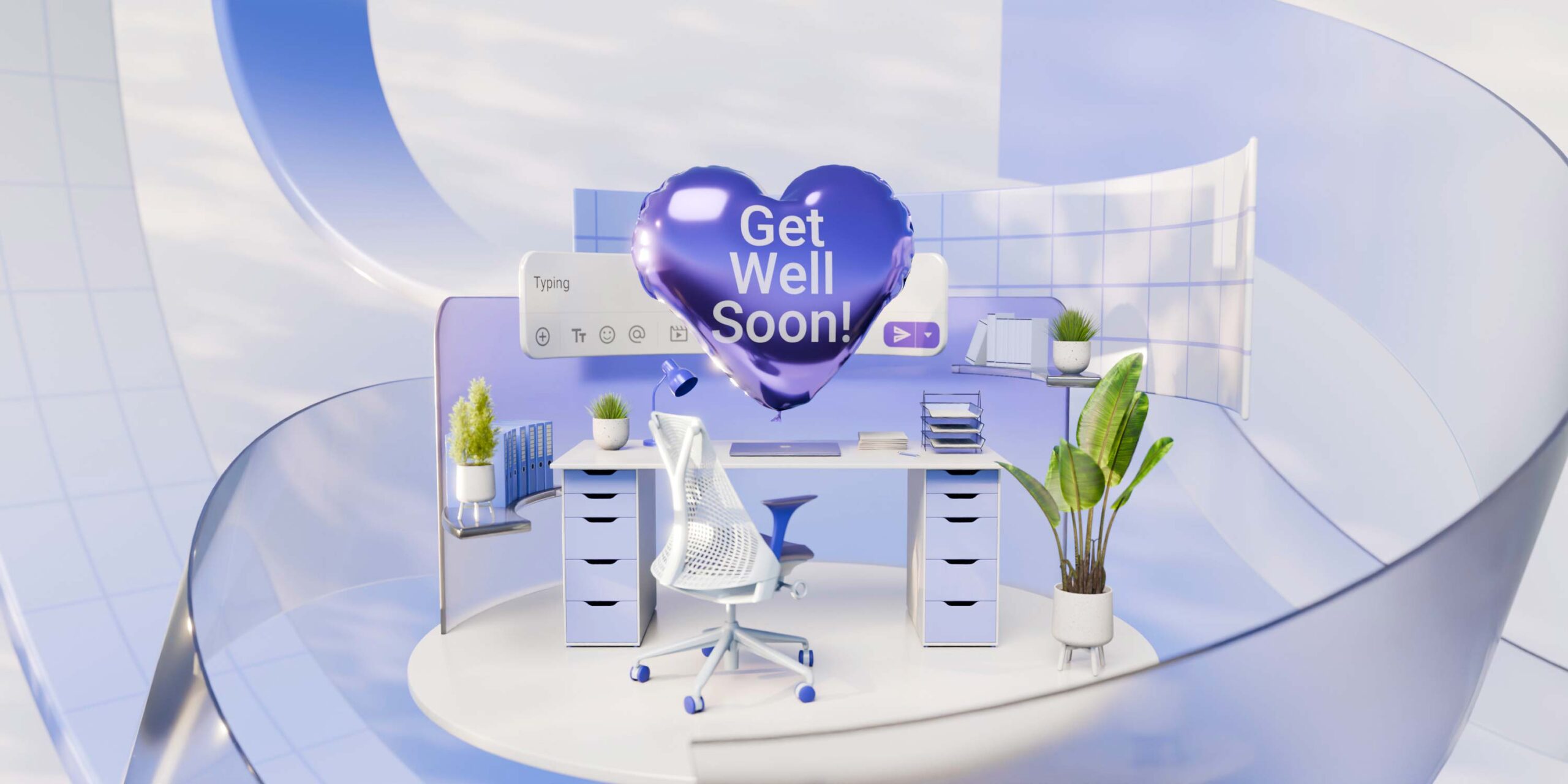
The case for telling your coworkers or employees to get well soon
As you can imagine, staying on good terms with your colleagues has many benefits. For one, practicing emotional intelligence at work has been shown to:
- Reduce stress,
- Improve teamwork, and
- Generally make work more enjoyable.
Extending “get well soon” wishes to the people you work with is a great way to demonstrate your capacity for empathy.
On top of that, a sincere message would go a long way to strengthen your relationship with the sick or injured coworker, employee, or client in question.
Then again, sending a “get well soon” message to your boss could also be perceived as schmoozing if you’re not careful.
However, as long as your “get well” wishes aren’t reserved solely for the higher-ups, you should be able to avoid being labeled a suck-up.
Outside of the effect your well-wishing might have on your personal — or, rather, professional — relationship with the recipient, it can also have a greater impact on the company culture.
After all, sending “get well soon” messages to people you work with is an excellent way to foster empathetic communication in the workplace.
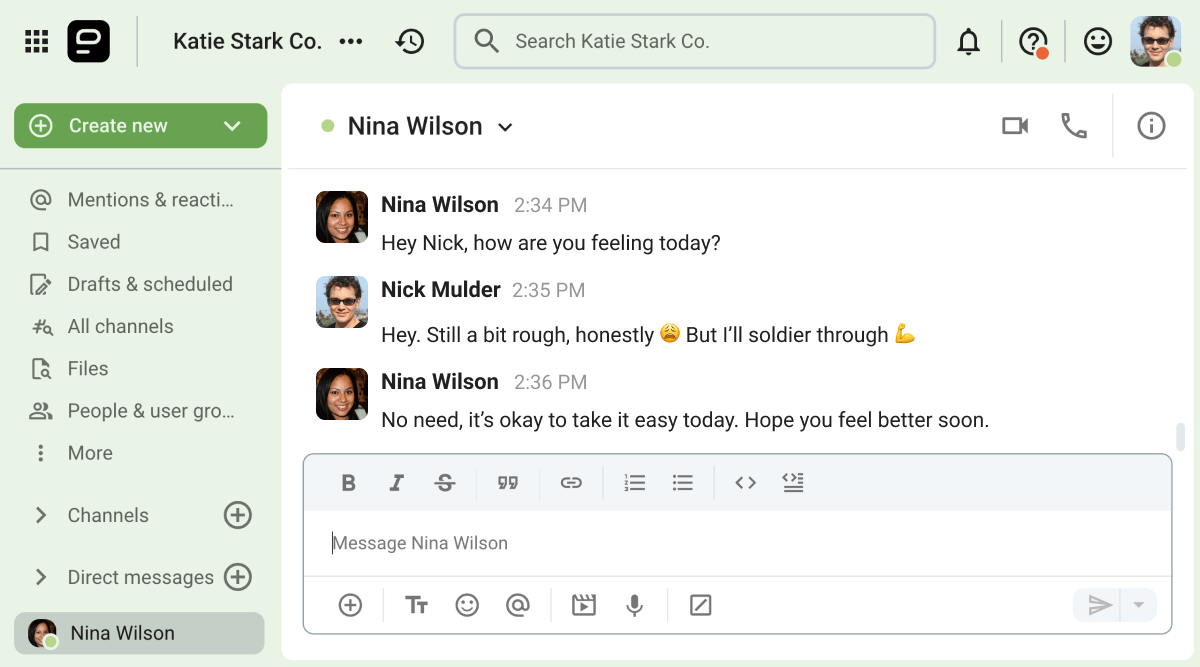
Promote empathetic communication at work with Pumble
If everyone is expected to exchange this kind of polite communication when someone is sick or injured, they will be more likely to maintain that tone even outside of those circumstances.
Having said that, let’s talk about how you can wish someone a speedy recovery from an illness or an injury.
How to express your get-well wishes to a coworker
Corporate talk has a (somewhat deserved) bad reputation. That much is clear. All those annoying buzzwords and impersonal business speak have a way of making people long for their next vacation.
So, let’s see how you should craft your well-intentioned message to a sick coworker to avoid falling into the most familiar pitfalls of professional communication.
Tip #1: Start with a warm greeting
Ideally, your ”get well soon” message should start with a friendly greeting. However, even this wording will depend on several factors, including:
- The messaging system or platform you’re using,
- How close you are to the person in question, and
- The tone you’re going for.
For example, if you’re sending the message over email, you’ll probably want to start with a “Dear [name]” or a simple “Hello, [name].”
On the other hand, if you’re using an employee communication app like Pumble by CAKE.com, you should be free to use a more casual greeting. Something along the lines of “Hey, I heard you’re out sick today” is a perfectly fine opener.
Notably, Pumble’s status feature can show you which of your coworkers is absent due to illness or injury. And, if your company uses Pumble in conjunction with its sister app, the time tracker, Clockify, employees will be able to apply for sick leave on Clockify and have their sick leave status automatically applied to their Pumble profiles.
As a result, the opening line you might use when discussing a coworker’s sick leave on Pumble might look something like this.
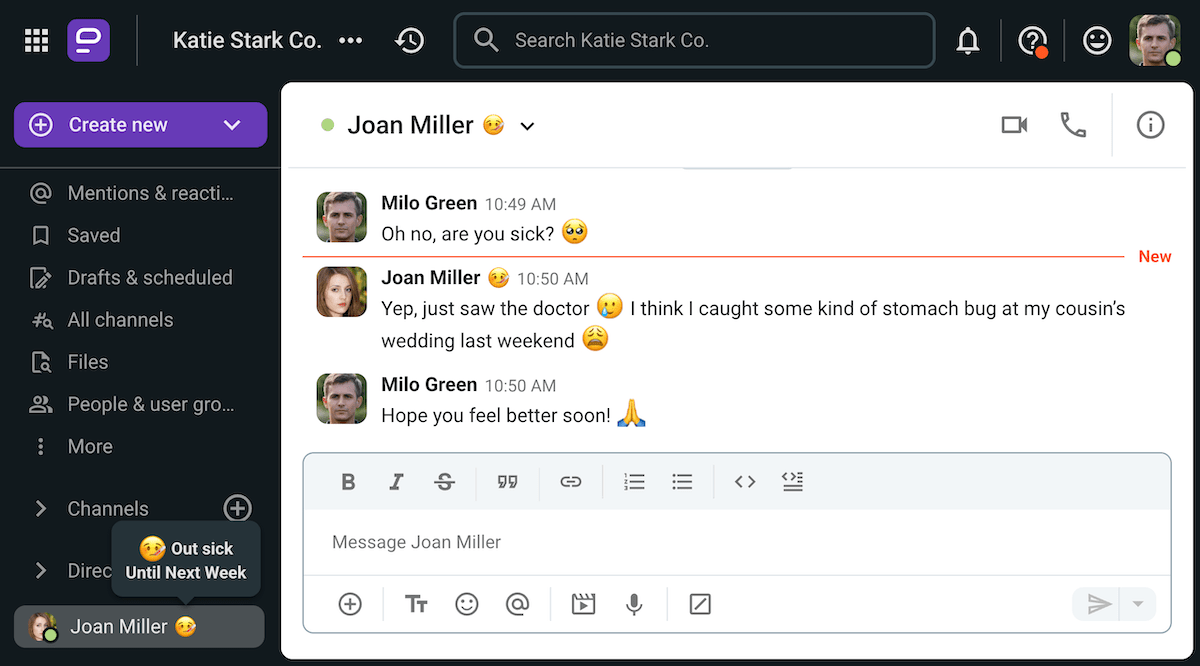
💡 PUMBLE PRO TIP
If you suspect that your coworker is struggling, you can start by sending them a simple check-in message by following the steps outlined in the guide below:
Tip #2: Consider your tone
At this point, you might want to think about an appropriate tone to aim for with your ”get well soon” message.
Whether you opt for a purely professional tone, a friendly one, or even a more lighthearted approach will ultimately depend on your closeness with the absent coworker.
However, if you want to go in on a positive (or even humorous) note, as in the example below, you should be pretty confident that the reason behind your coworker’s absence isn’t too dire. Otherwise, you’d run the risk of minimizing their struggles.
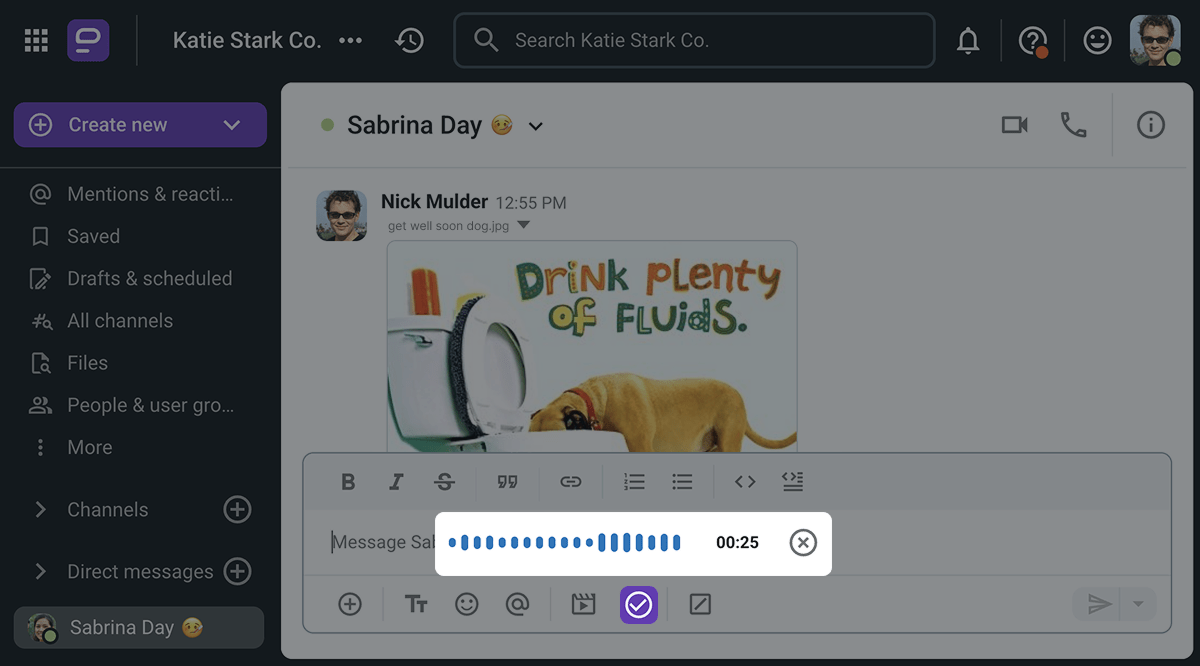
Exchange voice messages with your coworkers on Pumble
In addition to not being dismissive of someone’s health concerns, you should also try not to sound as if you’re prying. If you don’t know the coworker personally, you shouldn’t dwell on the nature of their condition. Even stating your admiration for how someone handles their circumstances can trigger negative emotions.
So, before sending your “get well soon” message, make sure it doesn’t:
- Dismiss or diminish your coworker’s pain (e.g., “Man, that’s nothing! I bet you could still finish the project on time!”),
- Offer unwanted advice or anecdotes (e.g., “Actually, my husband had the same surgery last year, and he only took a week to recover. I’ll send you a link where you can get the supplement he took!”), or
- Deflect from the main issue (e.g., “That sucks, but did you hear about what Susan did today?”).
When in doubt, just keep the message short and sweet. That should allow you to avoid any mistakes and misunderstandings.
Tip #3: Don’t infuse your message with urgency
When your coworker receives your ”get well soon” message, they shouldn’t feel like you’re telling them to return to work immediately.
With so many people feeling pressured to clock in even when sick, that would be the wrong tone. Here’s an example of the kind of message that really shouldn’t leave your drafts.
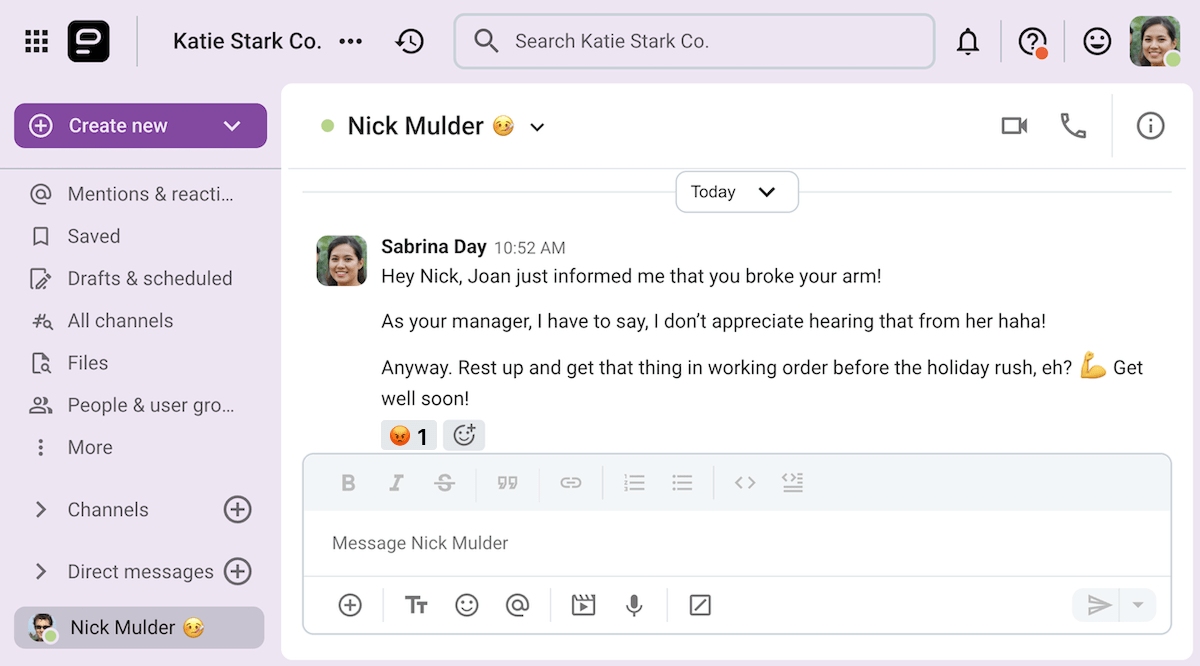
So many things went wrong here — and judging by that angry reaction emoji, Nick didn’t appreciate it either!
For one, there was no need to go into specifics about the type of injury poor Nick has sustained.
Even though it’s not technically a faux pas to mention it, not everyone would be comfortable knowing their injury was the subject of workplace gossip.
On top of that, the example above sets a deadline for Nick’s recovery process, which certainly won’t speed it up.
Tip #4: Express your core message
Finally, we get to the gist of the message — the “get well soon” part. Of course, you don’t have to use those exact words.
If you want to be a bit more original, you can use a “get well soon” alternative such as:
“Focus on your recovery!”
“Hope you feel better soon!”
“Work isn’t the same without you!”
“Wishing you a quick and easy recovery!”
“Your health is the most important thing!”
At this point, you could also share any information that might be pertinent — as long as it doesn’t veer too close to the inappropriate responses we’ve mentioned earlier. For example, you might want to inform your coworker that you’ll take on their share of the work so they can rest easy.
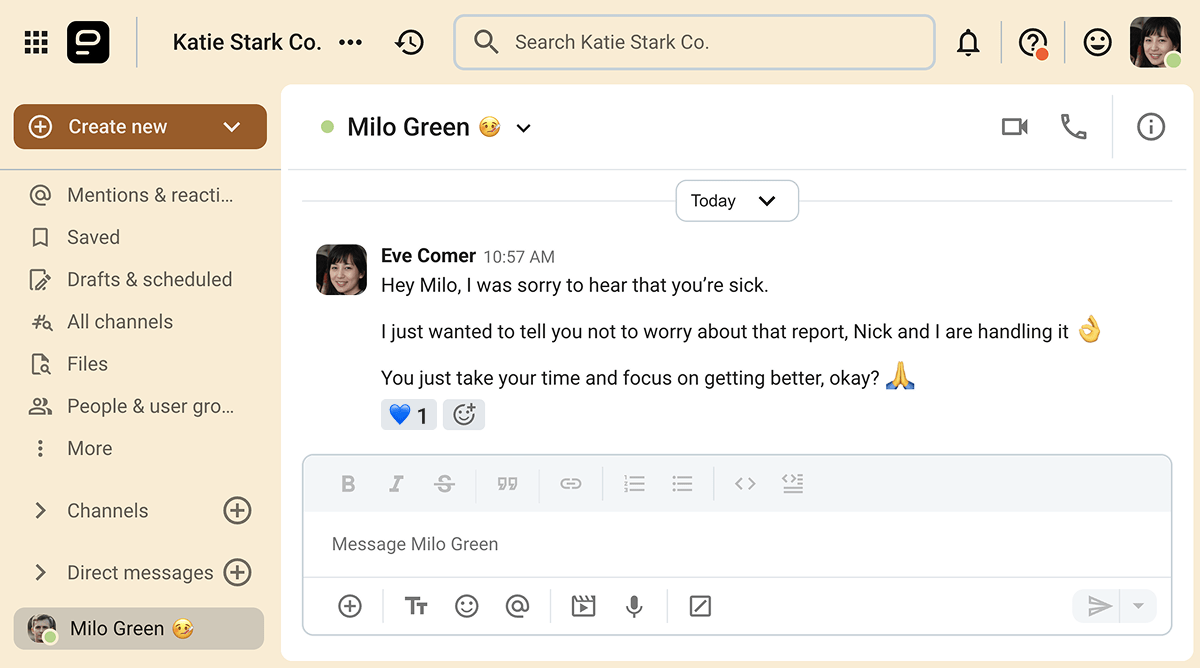
In the image above, we can see that Eve has informed a sick coworker that she will be taking over his project during his sick leave. That should help him be more at ease while he recuperates.
However, that kind of additional note isn’t always necessary.
Share, collaborate, & empathize with your team over Pumble
Tip #5: Sign off
As we have established, it’s usually best to keep these kinds of messages short and sweet. After all, when someone is sick or injured, they usually don’t have the energy to read through a big chunk of text. With that in mind, it’s time to bid your coworker adieu.
To that end, there are several phrases you could use to close out your “get well soon” message, including:
- “Rest up.”
- “Take care.”
- “Take your time.”
- “Thinking of you.”
- “Warmly, [your name]”
When we take into account everything we’ve discussed so far, the final message may look something like this:
“Everyone here misses you. Wishing you a speedy recovery! Take care.”
“Sucks to hear you’re sick! I’m already missing our break room shenanigans. Get well soon so I can have my work bestie back!”
“We’re all thinking about you. Feel free to take as much time off as you need. And don’t worry about that project, we’ll pick up the slack!”
“Hey, we were all sorry to hear about your injury. The team put together this care basket with your favorite snacks. We hope your recovery is quick and easy. Rest up and get back to us at your own pace.”
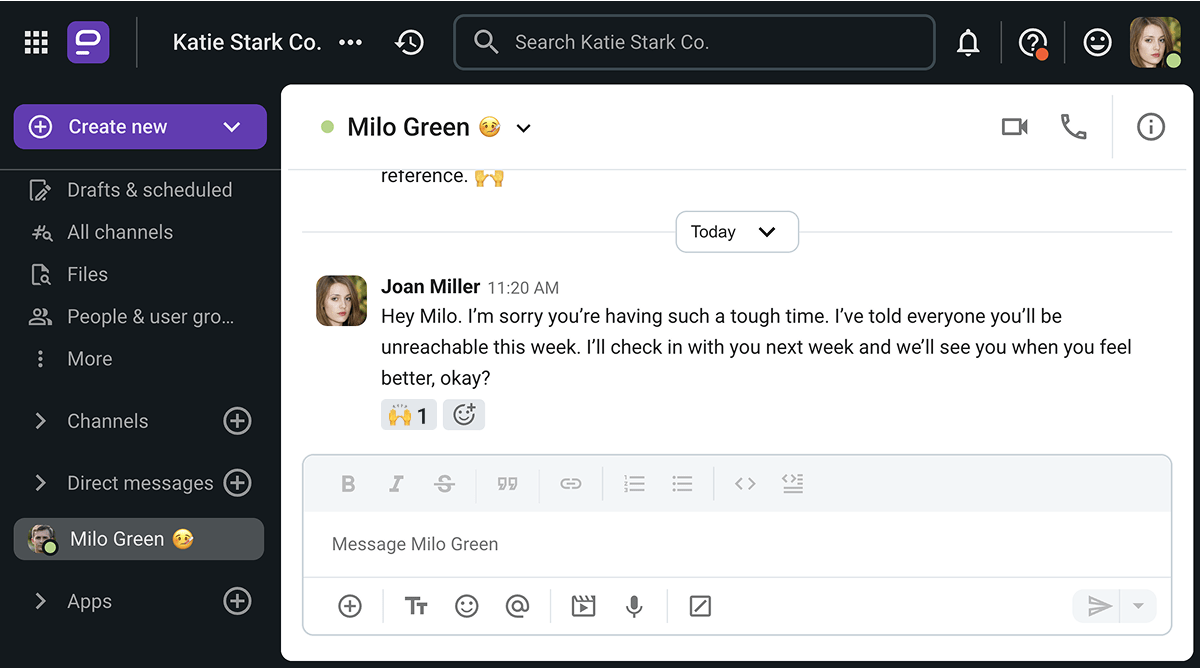
Keep everyone in the loop with Pumble
As you can see, your message doesn’t actually have to include the phrase “get well soon.”
After all, there are plenty of other ways to show the recipient of your “get well” wishes how much you care.
Optional tip #1: Be of use
If you’ve ever been on the receiving end of a “get well soon” message from your coworkers — or anyone else, for that matter — you’ll probably know that a lot of them contain a somewhat vague offer of help, such as “Don’t hesitate to let us know if you need anything! Get well soon.”
These kinds of generic offers tend to put the onus of figuring out what they need and how to ask for it on the recipient of the message.
Moreover, when coming from a person we’re not particularly close with, these additions may even sound insincere.
So, if you want to inject something extra into your “get well soon” message, you’ll need to be more specific.
Come up with an idea of how you might be of use to the sick or injured coworker. For example, you could say:
“Hey, you left your purse at the office when you went to the hospital earlier. I’ll drop it off on my way home if that’s okay with you.”
“If you don’t have anyone else to pick up medicine or groceries for you, I can do it. I live right around the corner anyway.”
“Hey, have you heard of this new show? It might stave off boredom while you’re recovering. I’d love to buddy-watch it with you. We can make a running commentary channel about it on Pumble.”
Like the other parts of your message, what you can say here will largely depend on your relationship with the recipient of the message. If you’re not close to them outside of work, even these examples may be inappropriate.
In that case, you can offer to take on a part of their workload or help them avoid falling behind in some other way.
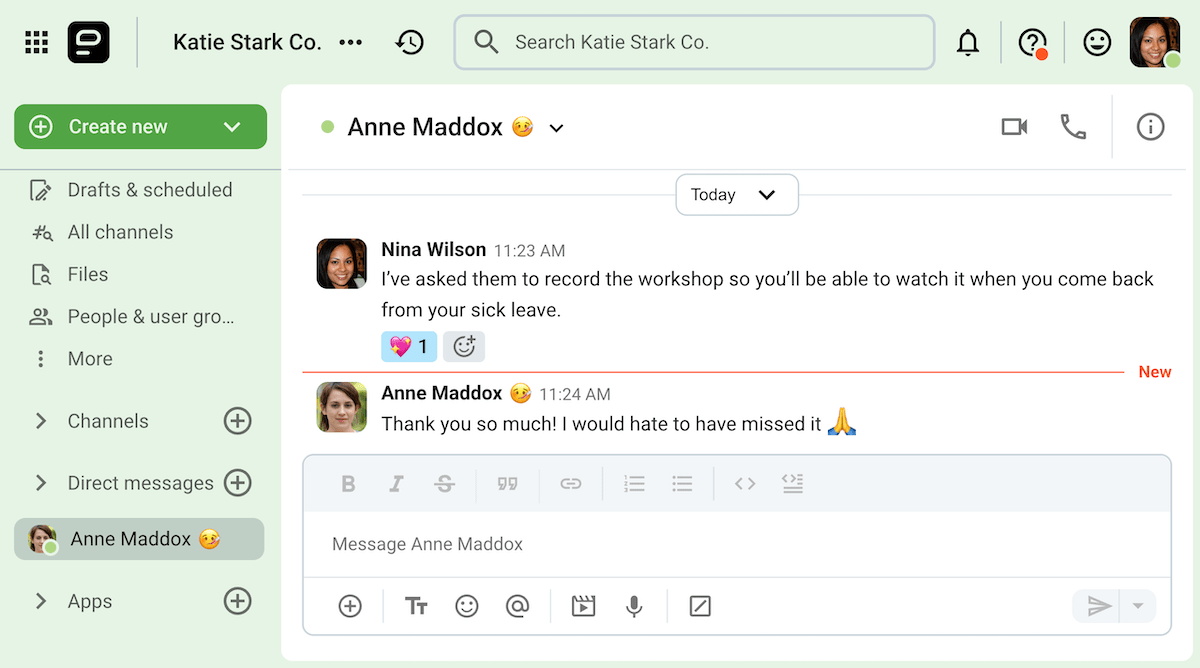
Optional tip #2: Include a gift
If you’re writing a “get well” message on behalf of the whole team, you could send a gift of some sort along with your sentiments. For example, you might include:
- A gift card from a store (or service) you know they love,
- A care basket full of items that might help them recover (tea, instant soup, snacks or treats, blankets or socks, a mug or a thermos), or
- Something to entertain them, such as a book, a fidget toy, or a puzzle.
Ideally, the gift should reflect the interests of your sick or injured coworker while also providing some comfort or entertainment while they recuperate.
So, if your coworker is big on skincare, you could send them a product you think they’d like. Alternatively, you could give them a gift card from their favorite drugstore.
On the other hand, if you know they like to play video games in their spare time, get them a gaming accessory.
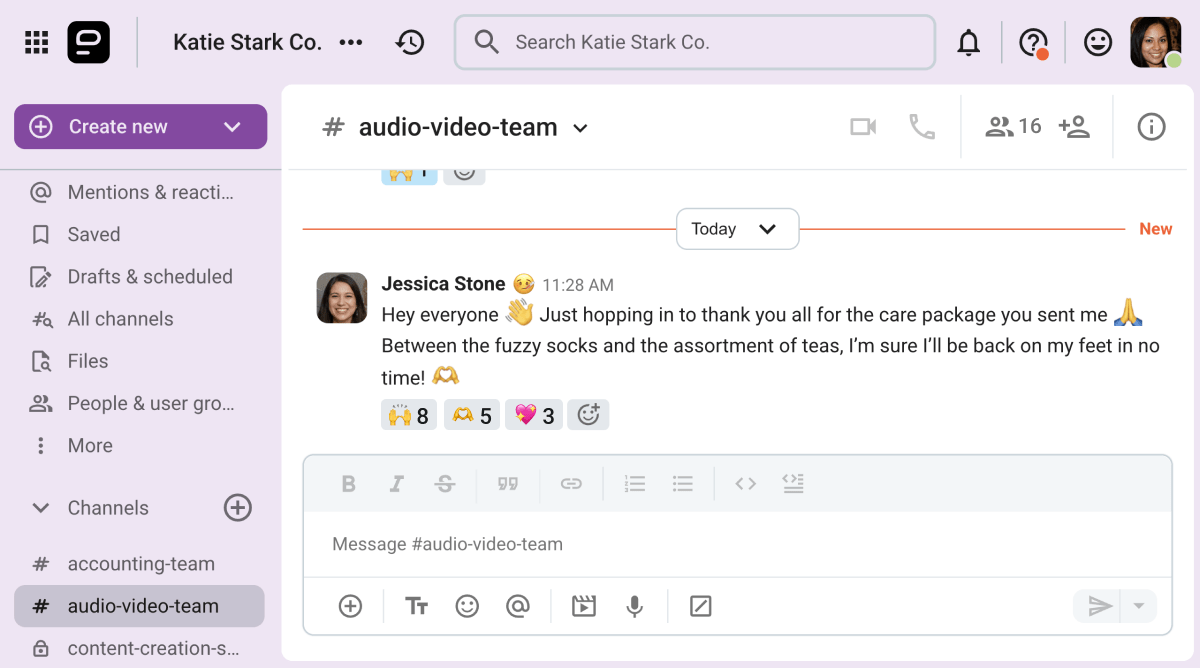
Tips for sending a professional get-well-soon message to employees, clients, or bosses
In the previous section, our tips mainly focused on interactions between presumably equal coworkers.
But how would you address a “get well soon” message to someone you have a more distant professional relationship with?
For example, how should you adjust the tone of your message when talking to your boss or a client?
Alternatively, what if you’re a manager looking to set a good example by wishing a speedy recovery to a sick employee?
Let’s talk about it!
How to write a professional “get well soon” message to an employee
If you’re a team leader or a manager, you’ll probably be the first to know when an employee on your team gets sick or injured.
Consequently, you’ll often be the one responding to such news with a “get well soon” email or a message.
According to a Senior HR professional with over 10 years experience, Joana Aviziute, your response should prioritize the employee’s health, rather than work:

“[When responding to] junior employees, I would balance professionalism with mentorship. Reassure them their work is covered and recovery is the priority.”
In addition to sending a sincere “get well soon” message, you can also take the initiative by ordering a gift basket or sending flowers to the employee.
Just keep in mind that unless you work in a small, close-knit team, you should make the wording of your message more formal, as is typically the norm in instances of downward communication.
Having said that, let’s see some examples of a “get well soon” message you can send to a sick employee.
“Hello, Mary. I just approved your sick leave. Don’t worry about a thing, just focus on your recovery. We’ll see you when you’re healthy again.”
“I’ve informed the team that you’ll be taking a sick leave. We’ll see you when you’re well again. Take your time and get better.”
“Dear Joan,
Thanks for letting me know about your condition.
Take as much time off as you need, and let us know when you’re ready to come back in.
Best regards.”
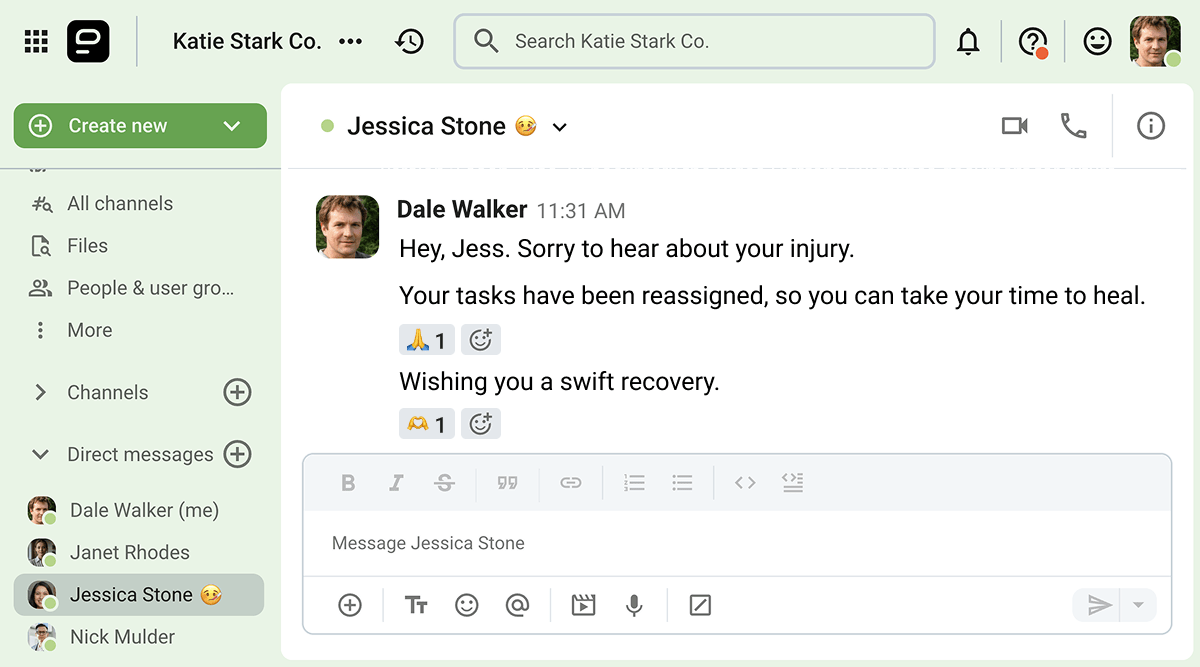
💡 PUMBLE PRO TIP
Knowing how to reassure your employees is a key aspect of empathetic leadership. To learn more, check out this article:
How to write an appropriate “get well soon” message for your boss
As you can imagine, writing a “get well soon” message to your boss would still be a pretty formal affair.
If you work in a traditional company that puts a lot of weight on hierarchy, you may not even be on a first-name basis with your boss.
On the other hand, an increasing number of businesses encourage employees to address people who are technically above them on the company ladder more casually.
If you work in that kind of environment, you may have already found a good template for creating a “get well soon” message for your boss in the guide above.
But, when in doubt, Joana Aviziute recommends approaching this sort of upward communication with a mixture of professionalism and sincerity:

“[When writing a ‘get well soon’ message to] managers or higher-ups, maintain professional respect while expressing genuine concern. Be concise and thoughtful.”
Now, let’s see some examples of what that interaction might look like.
“Sorry to hear you’re under the weather, chief. Rest assured, we’ve got everything covered here. You just focus on healing.”
“Everything is under control at the office, so you can take your time recovering from your surgery. We’ll see you soon, boss.”
“The team was sorry to hear about your condition, but don’t worry. We’re all hard at work, so you can take as much time as you need to get better.”
“Everyone at the office wishes you a speedy recovery, sir. Get well soon!”
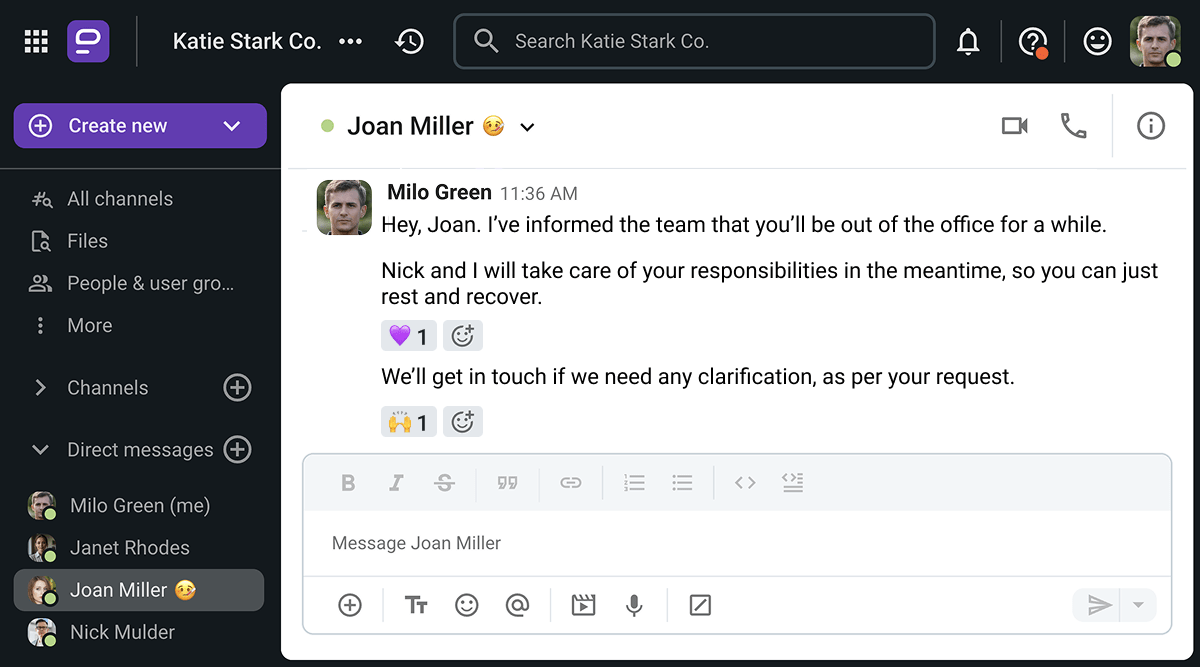
How to send a professional “get well soon” message to a client
If your work requires you to communicate with third parties like clients or contractors, you may want to learn how to send a professional “get well soon” message when those collaborators get sick or injured.
Though most of our exchanges with external collaborators tend to center around work, now would be the time to put that on the back burner, as Joana Aviziute advises:

“Keep your ‘get well soon’ messages for clients brief, professional, yet warm. Focus on their well-being rather than partnership implications.”
If you must mention work, you should only do so to reassure the client that they don’t need to think about anything else while recuperating.
As always, your exact wording will depend on your previously established relationship with the person in question.
And, if you want to go the extra mile, you can also prepare some sort of gift, like flowers or a care basket.
Having said that, let’s see some examples of a professional “get well soon” message you might send to a client.
“I’m sorry to hear about your health issues. I’m open to changing our production plans to suit your current needs. Let me know what I can do to make your recovery easier.”
“I was sad to hear about your illness. We could pick this project back up once you’re well again if you’d like. Let me know what you decide, and get well soon.”
“I just heard about your condition from your assistant and would like to wish you a smooth and swift recovery. I’ll continue working on the project so it’ll be ready for you when you feel better.”
“Thank you for letting us know about your condition. We hope to see you back on your feet soon. Until then, take your time to rest and recover.”
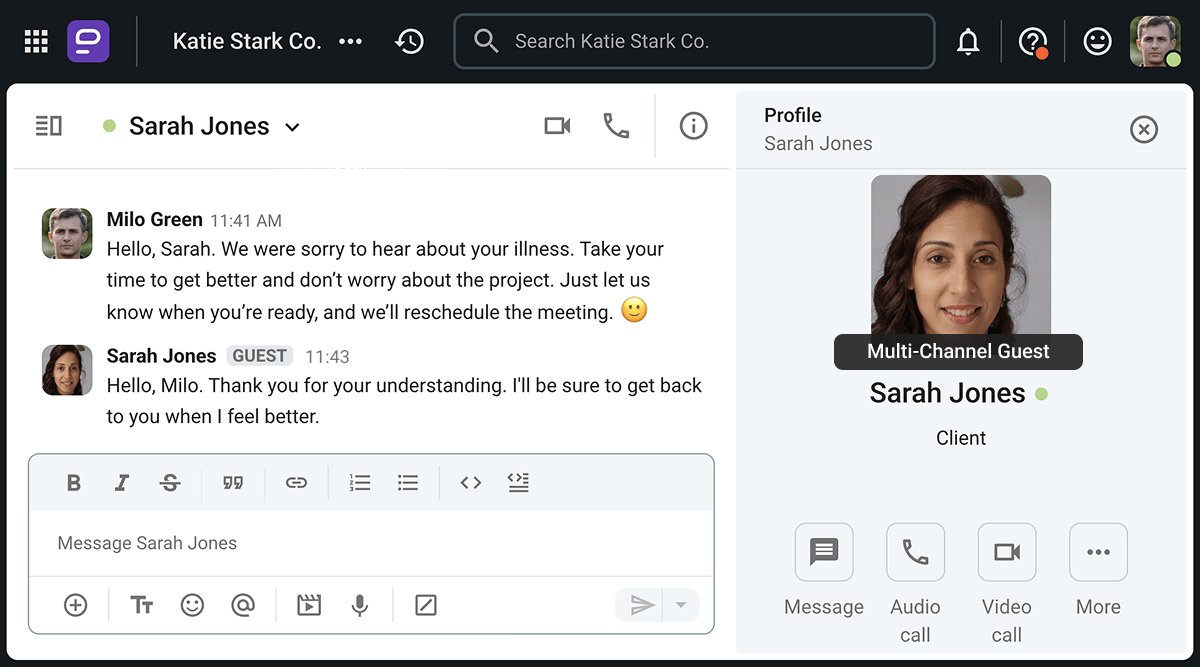
Use guest accounts to communicate with external collaborators on Pumble
When is it not appropriate to send someone “get well” wishes?
Throughout this guide, we have highlighted the importance of understanding the context surrounding your professional interactions. Now, we’d like to continue along those lines to consider when sending a “get well soon” message may be ill-advised.
Deciding whether or not to send that message will depend on multiple factors, including:
- The timing,
- Your relationship with the sick or injured party,
- The company culture, and
- The circumstances surrounding their sick leave.
With that in mind, let’s explain how these factors might influence your decision to send that “get well soon” message by going over some fictional scenarios.
Factor #1: Timing
Let’s start by explaining how timing may affect your decision.
For example, if your coworker has been sick for a week already and you’ve exchanged messages without acknowledging the illness, you may have missed your window of opportunity.
While there’s no strict timeline during which you should hit send on your “get well soon” message, waiting more than a few days after hearing the news could render your gesture irrelevant.
Of course, there are some exceptions to this rule. For example, if a coworker is diagnosed with a chronic health condition, you might reach out to offer your support.
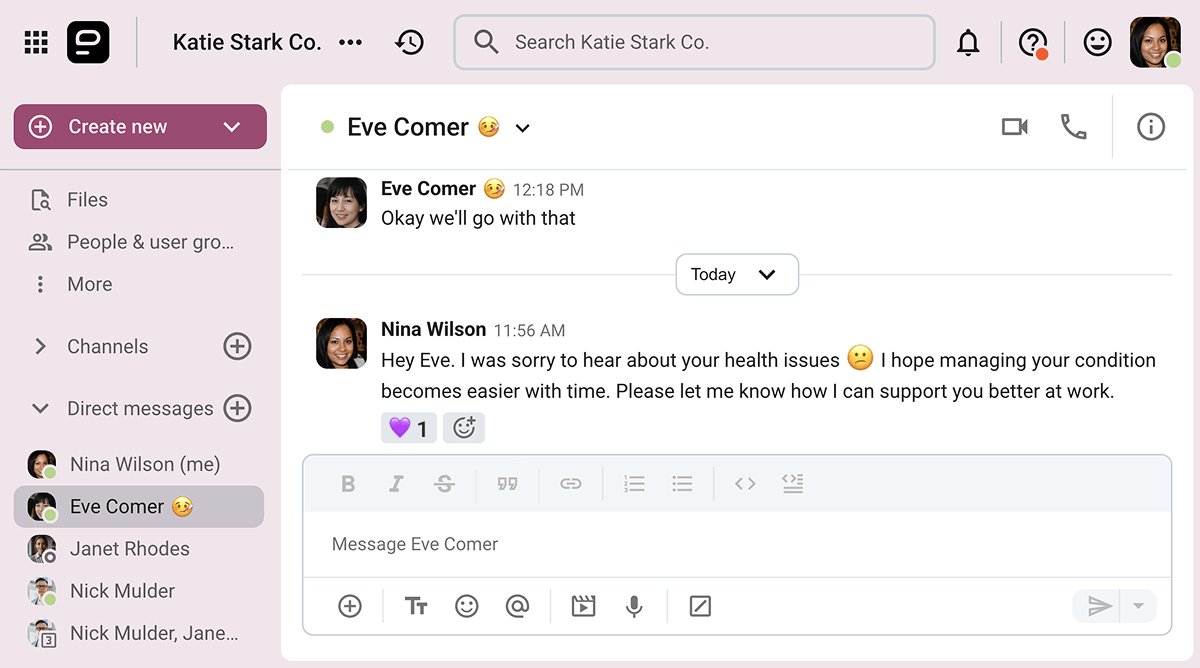
However, other factors — such as your level of closeness to the coworker in question — may still prevent you from reaching out even if the timing does not.
Factor #2: Your relationship with the sick or injured teammate
Now, if the sick or injured coworker isn’t someone you usually interact with, there’s no need to start when one of you is sick.
Of course, if you’re their manager or employee, wishing for their quick recovery should still be appropriate, but it’s not mandatory.
However, if you’re thinking of sending Susan from Accounting a “get well soon” message because you heard some gossip in the break room, we urge you to reconsider — unless you are friends.
But what happens if Susan is the bane of your existence? Should you try to use a “get well soon” text message to alleviate the tension in an otherwise strenuous relationship?
Survey says: now is not the time.
If you want to patch up your relationship with a coworker who’s gone on sick leave, it’s best to wait until they come back to work.
The next time you see them, you can simply say: “We missed you around the office while you were out!” or “Glad to have you back!” and let that be your jumping-off point for future interactions.
In fact, sparing a moment to welcome a coworker who’s just come back from sick leave can serve as a nice gesture and promote team unity. You can even do that during a group video call, as shown below.
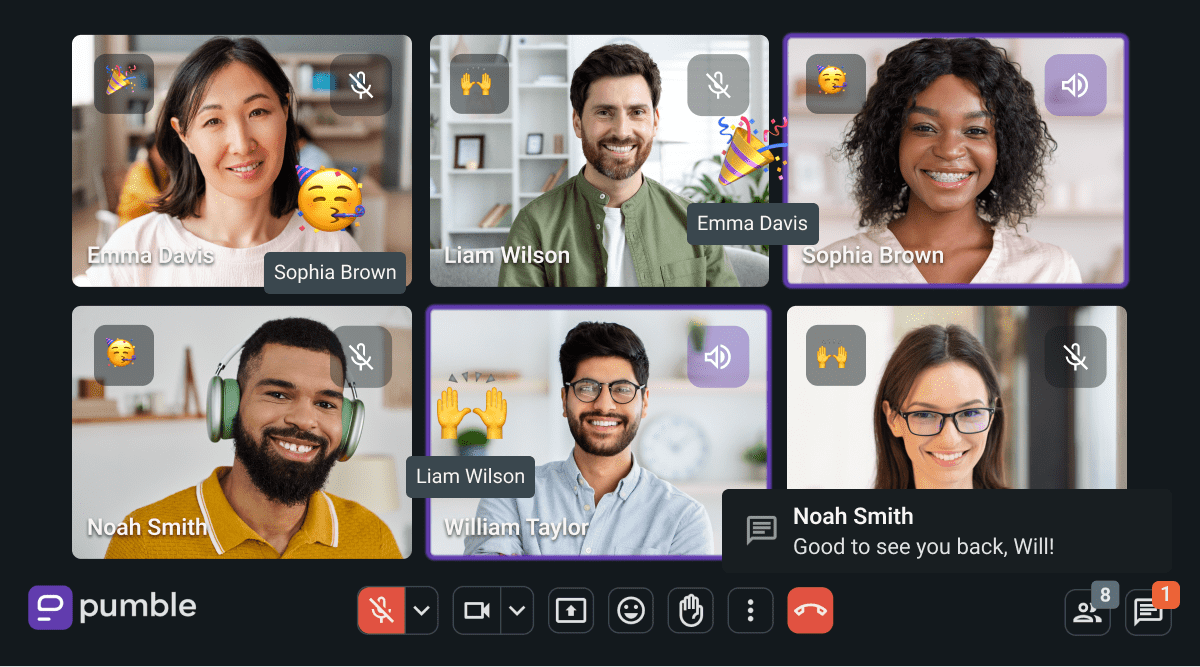
Choose your favorite emoji reactions for video calls on Pumble
Factor #3: The company culture
Next, there’s the question of whether your company culture has been set up to encourage or discourage get-well wishes between employees.
If you work at a smaller company, you’ve probably spoken to most of the other employees. In that case, sending a “get well soon” message would be par for the course.
However, in bigger companies, you probably wouldn’t have much cause to message people from other teams or departments.
In that case, sending your get-well wishes to Susan from Accounting may be considered somewhat strange.
Still, even big companies can encourage employees to at least celebrate the return of employees who have been on medical leave.
For example, the company might post an announcement on a public channel when employees return from maternity leave, encouraging others to respond with emoji reactions, as seen below.
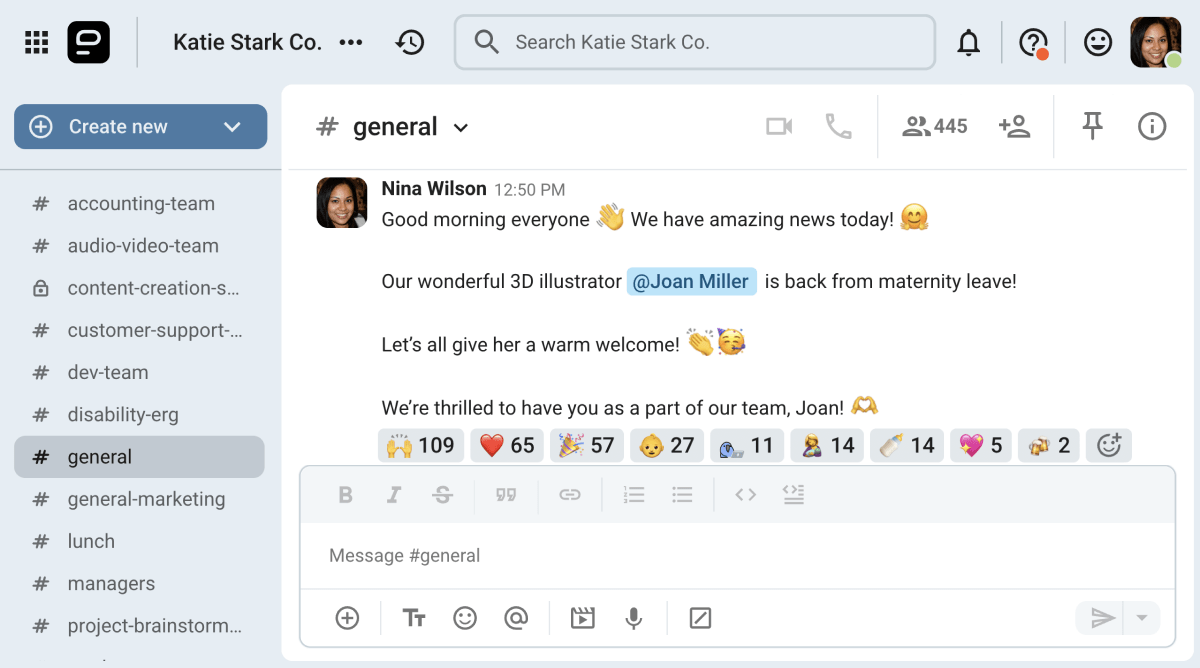
Create a supportive company culture on Pumble
Factor #4: The circumstances surrounding their sick leave
Telling someone to get well soon can sometimes be a faux pas if the recipient of the message has sustained a major injury or been diagnosed with a chronic illness.
Someone about to go through, say, a cancer treatment or a potentially life-changing surgery isn’t likely to get better soon — in the literal sense of the phrase.
Additionally, these extreme situations tend to inspire some people to share anecdotes of others struggling with comparable symptoms or diagnoses.
They also make some people want to take a shot at prognosticating the patient’s recovery time by saying something like “I know you’ll get through this” or “I’m sure you’ll be back at the office in no time.”
To avoid these kinds of mistakes, you might use alternative phrases such as:
“We’re all here for you!”
“Our thoughts are with you.”
“Wishing you strength and perseverance!”
“We’re sorry to hear that you’re going through such a tough time.”
Ultimately, you can avoid treading on anyone’s toes by following Joana Aviziute’s advice:

“When crafting professional get well messages:
- Firstly, confirm with the employee’s manager to ensure they want to be contacted about their absence,
- Express genuine concern without prying about medical details,
- Acknowledge their absence but don’t emphasise work implications,
- Offer specific, practical assistance such as Employee Assistance Programme or Occupational Health options if appropriate,
- Respect privacy and boundaries around their condition, and
- Close with warm but professional well-wishes.”
Use Pumble by CAKE.com to send your well wishes to coworkers
How you respond to a coworker, employee, or client during their time of need will certainly test your professional communication skills.
However, showcasing your empathy in a professional setting is also a great way to create a more pleasant working environment for everyone around you.
So, if circumstances allow, go ahead and send your coworker that “get well soon” message — and use Pumble to do it!
Pumble by CAKE.com is a team communication and collaboration app that allows you to quickly and easily communicate with anyone from your company.
You can:
- Communicate your well wishes in real-time via direct messages, channels, and threads,
- Send voice messages, video messages, and share files (maybe a nice “Get well soon” card?), and
- Schedule voice calls or video calls to welcome employees back after their sick leave.
Create a supportive work environment by offering your sincere well wishes to your coworkers when the opportunity presents itself.



